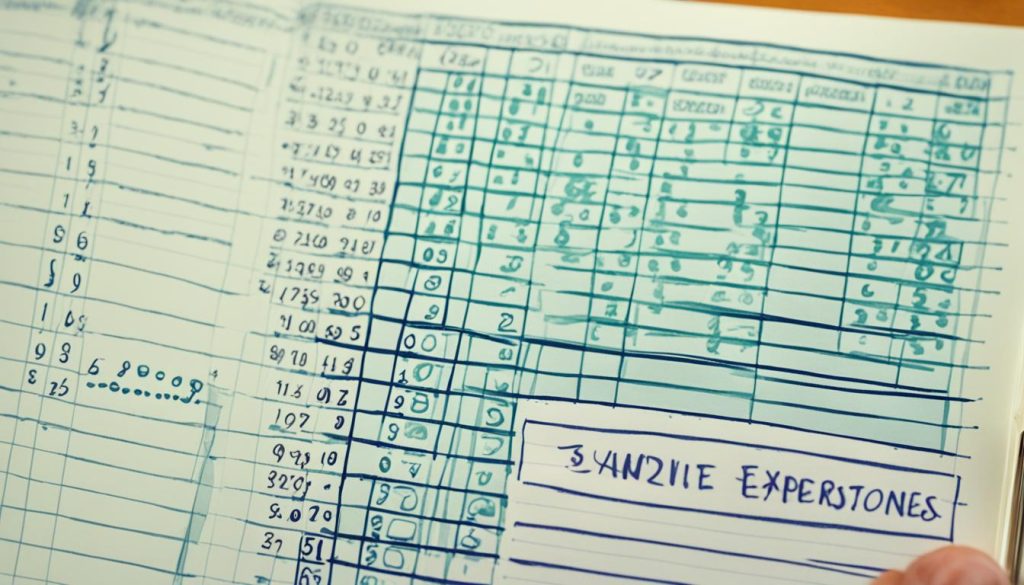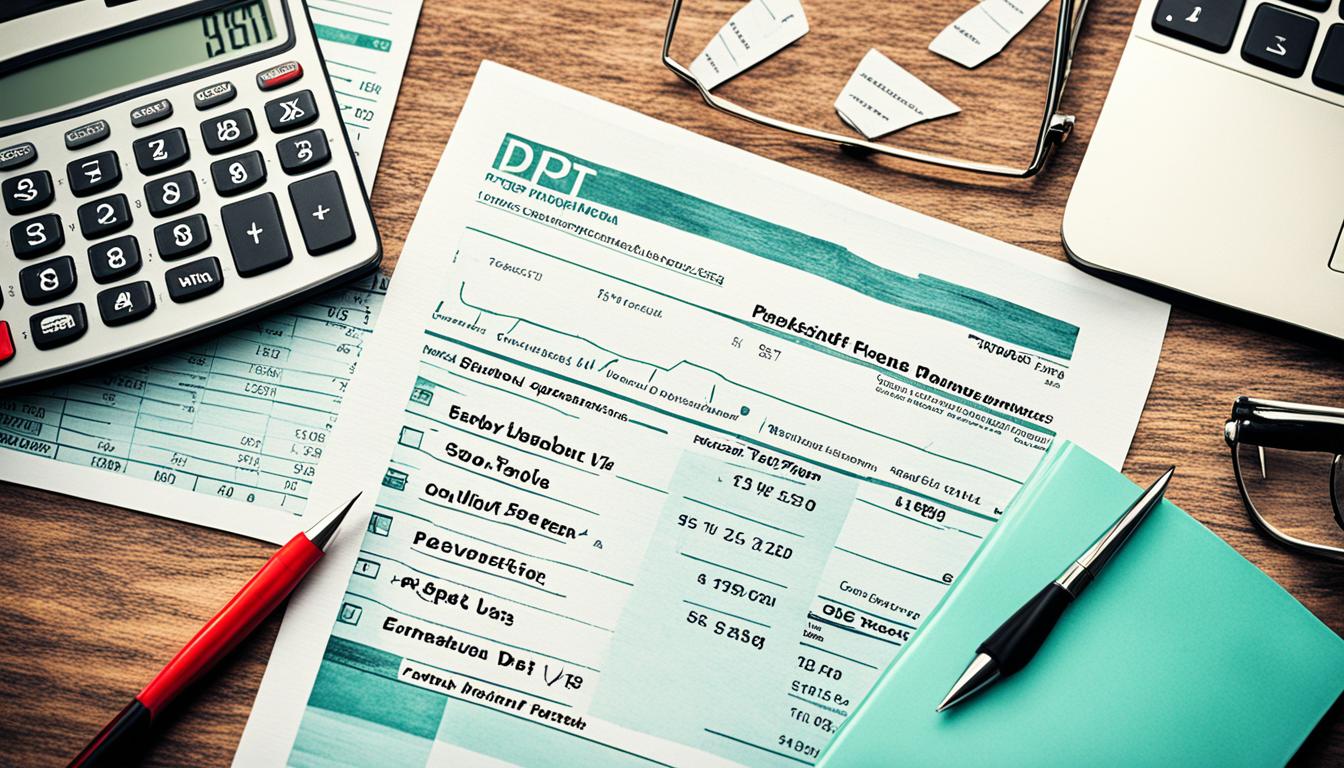Managing personal finance debt is a crucial step towards achieving financial freedom and taking control of your financial future. Understanding the importance of debt management and implementing effective strategies and tools can help you work towards becoming debt-free. In this section, we will explore key components of debt management, provide tips for maintaining financial discipline, and guide you on cutting costs to tackle your debts head-on.
Key Takeaways:
- Debt management is essential for financial freedom and regaining control over your finances.
- Prioritize your debts based on interest rates and minimum payments to create an effective plan.
- Determine your financial standing by calculating your debt-to-income ratio and assessing your net worth.
- Create a realistic budget by considering your income, fixed and variable expenses, debt payments, emergency fund, and savings.
- Maintain financial discipline by tracking expenses, cutting back on unnecessary spending, and increasing debt payments.
Understanding the Importance of Debt Management
Debt management is a crucial aspect of personal finance that goes beyond simply paying off debts. It involves taking control of your finances, understanding your debts, and creating a plan to achieve your financial goals.
One of the first steps in effective debt management is prioritizing your debts based on interest rates and minimum payments. By focusing on high-interest debts or those with higher minimum payments, you can minimize the overall impact of debt on your financial health. This strategic approach allows you to allocate your resources efficiently and reduce your debt load more effectively.
A key tool in debt management is creating a budget that helps you manage your finances and allocate funds towards debt repayment. A well-designed budget enables you to track your income and expenses, ensuring that you have a clear picture of your financial situation. By budgeting effectively, you can minimize unnecessary expenses, cut back on non-essential spending, and optimize your available funds for debt repayment.
Understanding the importance of debt management also means recognizing the impact it has on your financial goals. Whether you are saving for a down payment on a house, planning for retirement, or pursuing other long-term objectives, getting your debt under control is crucial. By managing your debt effectively, you can free up resources and redirect them towards achieving your financial aspirations.
Debt management is not just about meeting minimum payments. It’s a strategic approach that helps you regain financial control and work towards your long-term objectives.
Debt management also provides a sense of financial security and stability. By minimizing debt and adopting responsible financial habits, you can build resilience to unexpected financial challenges. This can be achieved through the establishment of an emergency fund, which acts as a safety net to cover unforeseen expenses, ensuring that you stay on track with your financial goals even during difficult times.
By understanding the importance of debt management, you can take the necessary steps to improve your financial well-being. Whether you are looking to reduce your debt load, achieve specific financial goals, or simply gain control over your finances, effective debt management is the key to financial freedom and a more secure future.
The Benefits of Debt Management
1. Financial freedom: By effectively managing your debt, you can free up resources and gain more control over your financial situation, allowing you to make choices that align with your long-term goals.
2. Reduced stress: Debt can be a significant source of stress and anxiety. By implementing debt management strategies, you can reduce financial stress and improve your overall well-being.
3. Improved credit score: Responsible debt management can positively impact your credit score over time. As you make timely payments and reduce your debt load, your creditworthiness improves, opening doors to better financial opportunities.
4. Greater financial security: By reducing debt, building an emergency fund, and adopting responsible financial habits, you can establish a stronger financial foundation, ready to face unexpected challenges.
Understanding the importance of debt management is the first step towards achieving financial freedom and setting yourself up for long-term financial success. By taking control of your debts, creating a budget, and prioritizing your financial goals, you can overcome your debt load and work towards a more secure financial future.
How to Determine Your Financial Standing?
Before creating a debt management plan, it’s crucial to determine your financial standing. This involves several key factors:
- Calculating your debt-to-income ratio
- Reviewing your credit report
- Assessing your net worth
By understanding these important elements, you gain a clear picture of your financial situation, enabling you to make informed decisions and take appropriate action. Let’s explore each of these factors in more detail:
Calculating Your Debt-to-Income Ratio
Your debt-to-income ratio is a crucial figure in determining your financial health. It measures the percentage of your income that goes towards paying off debts each month. To calculate your debt-to-income ratio:
Divide your total monthly debt payments by your total monthly income, then multiply the result by 100 to get the percentage.
Reviewing Your Credit Report
Your credit report is a detailed record of your credit history, including your borrowing and repayment activities. By reviewing your credit report:
- Check for errors or discrepancies
- Identify any outstanding debts
- Ensure all information is accurate and up to date
An accurate credit report provides valuable insights into your financial standing and helps you detect potential issues that may affect your debt management plan.
Assessing Your Net Worth
Your net worth is the difference between your total assets and your total liabilities. To assess your net worth:
- List down all your assets, including cash, savings, investments, and property.
- Calculate the total value of your assets.
- List down all your liabilities, such as loans, credit card debt, and mortgages.
- Calculate the total value of your liabilities.
- Subtract the total value of your liabilities from the total value of your assets.
Your net worth provides valuable insight into your overall financial health, enabling you to understand the proportion of your assets to your debts.
By determining your financial standing through calculating your debt-to-income ratio, reviewing your credit report, and assessing your net worth, you gain a comprehensive understanding of your current financial situation. Armed with this information, you can begin creating a realistic budget and confidently focus on paying off your debts.

Key Components and Considerations
Creating a realistic budget is a fundamental step in successfully managing your debt and achieving your financial goals. It involves carefully assessing your income, identifying your fixed and variable expenses, incorporating your debt payments into your budget, establishing an emergency fund, and setting aside savings for the future.
Assessing your income is the first step in creating a realistic budget. Take into account all sources of income, including your salary, any additional streams of revenue, and income from investments or rental properties. Understanding your total income will help you determine how much you can allocate towards debt repayment, savings, and other financial obligations.
Identifying your fixed expenses is crucial for accurately budgeting your monthly expenses. These include recurring costs that remain consistent each month, such as rent or mortgage payments, utilities, insurance premiums, and loan payments. By clearly listing your fixed expenses, you’ll have a better understanding of your financial obligations and can plan accordingly.
Variable expenses, on the other hand, fluctuate from month to month and may include things like groceries, dining out, entertainment, and personal care. Tracking your variable expenses will provide insights into where you can potentially cut back and allocate more towards debt payments or savings.
The next important component of a realistic budget is incorporating your debt payments. Prioritize your debts based on interest rates, minimum payments, and any other necessary considerations. By including these payments in your budget, you ensure that you’re staying on track with your debt management plan and avoiding late fees or penalties.
Establishing an emergency fund is a vital consideration in your budgeting process. Aim to set aside a small portion of your income each month to contribute to an emergency fund that can cover unexpected costs, such as medical expenses or car repairs. Having an emergency fund in place provides a financial safety net and prevents you from adding to your debt in times of crisis.
Savings should also be a priority in your budget. Whether you’re saving for short-term goals like a vacation or long-term goals like retirement, allocating funds towards savings ensures that you’re building a strong financial foundation for the future.
By considering these key components and incorporating them into your budget, you’ll have a clear roadmap for managing your debts, maintaining financial discipline, and working towards a debt-free future.

Tips for Maintaining Financial Discipline
When it comes to managing your debt effectively, maintaining financial discipline is crucial. By practicing discipline, you can stay on track with your debt management goals and make steady progress towards becoming debt-free. Here are some valuable tips to help you maintain financial discipline:
- Create and Stick to a Realistic Budget: Developing a realistic budget is the foundation of maintaining financial discipline. Take the time to analyze your income and expenses, and allocate your funds accordingly. Ensure that your budget allows for debt payments along with your essential needs.
- Track Your Expenses: To avoid overspending and maintain financial discipline, it’s important to track your expenses regularly. This will help you identify areas where you can cut back and save money. Consider using budgeting apps or spreadsheets to simplify the process.
- Cut Back on Unnecessary Expenses: Review your expenses and identify any non-essential items or services that you can do without. Cutting back on unnecessary expenses can free up more money to put towards debt payments, helping you reach your goals faster.
- Increase Your Debt Payments: Whenever possible, try to increase the amount you pay towards your debts. Even a small increase can make a significant difference over time. Consider using any extra income, such as bonuses or tax refunds, to make additional debt payments.
By following these tips and maintaining financial discipline, you can effectively manage your debt and work towards a debt-free future.

Strategies for Paying Off Debt Faster
When it comes to achieving financial freedom, implementing strategies to pay off debt faster is key. By taking proactive steps, you can accelerate your journey towards becoming debt-free. Let’s explore some effective strategies that can help you expedite your debt repayment:
1. Debt Snowball Method
The debt snowball method is a popular approach to paying off debt. Start by targeting the smallest debt first and make extra payments towards it while paying the minimum on other debts. Once the smallest debt is paid off, roll over the payments to the next debt, creating a snowball effect that gains momentum over time. This method provides a psychological boost as you see progress and motivates you to continue paying off larger debts.
2. Increased Income
Another effective strategy is to increase your income. Consider starting a side business, freelancing, or getting a part-time job to generate additional cash flow. The extra income can be used to make larger debt payments and accelerate your progress. Look for opportunities to leverage your skills or hobbies to earn extra money, enabling you to pay off debts faster and achieve financial freedom sooner.
3. Reduce Expenses
Reducing your expenses is an essential component of paying off debt faster. Take a close look at your budget and identify areas where you can cut back on unnecessary expenses. This could include dining out less frequently, cancelling unnecessary subscriptions or memberships, or finding more affordable alternatives for everyday expenses. By trimming your expenses, you can free up more money to put towards debt repayment.
By implementing these strategies, you can fast-track your debt repayment and make significant progress towards achieving financial freedom. Remember that every little bit counts, so stay committed and motivated to achieve your goal of being debt-free.

Conclusion
Breaking free from debt and achieving financial freedom is within your reach. With effective personal finance debt management strategies and tools, you can regain control over your finances and pave the way to a debt-free future. By understanding the importance of debt management, determining your financial standing, creating a realistic budget, maintaining financial discipline, and implementing strategies to pay off debt faster, you can make significant progress towards your financial goals.
Remember, achieving financial freedom requires determination and a proactive approach. Take the time to assess your debts, create a budget that aligns with your financial goals, and incorporate debt payments into your monthly expenses. By maintaining financial discipline and making smart financial choices, such as tracking expenses and cutting back on unnecessary costs, you can speed up your debt repayment process.
Utilize available tools and resources to support your journey towards financial freedom. Leverage online budgeting apps, expense tracking tools, and debt calculators to stay organized and motivated. Seek advice from financial experts and consider joining support communities to gain insights and stay motivated on your debt management journey.
By implementing these strategies and adopting a proactive mindset, you can overcome your debt and achieve the financial freedom you desire. Take the first step today towards a brighter financial future.




No comments! Be the first commenter?